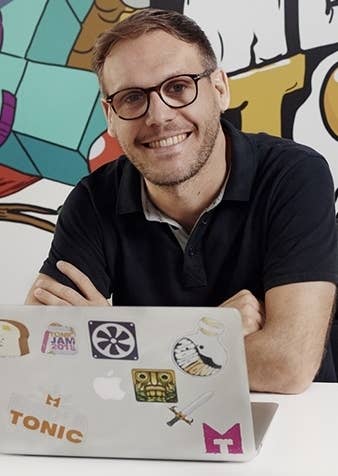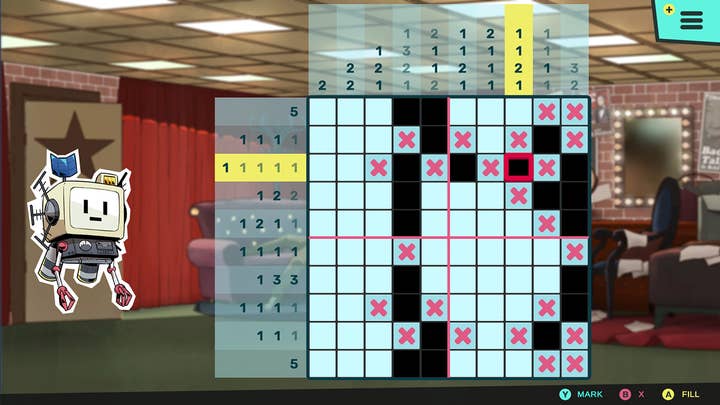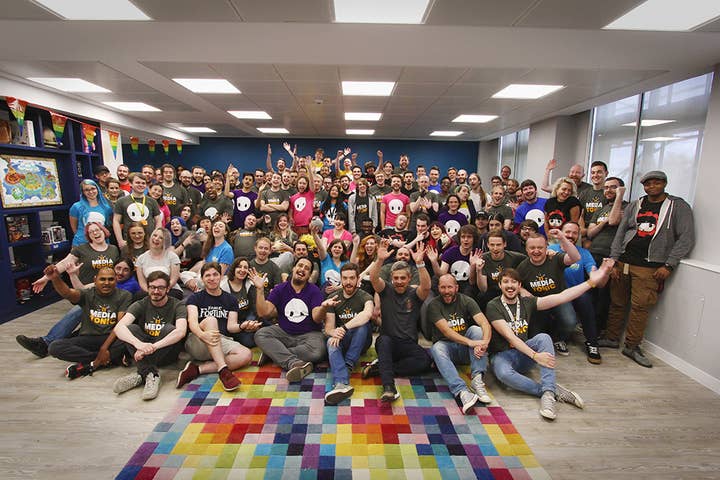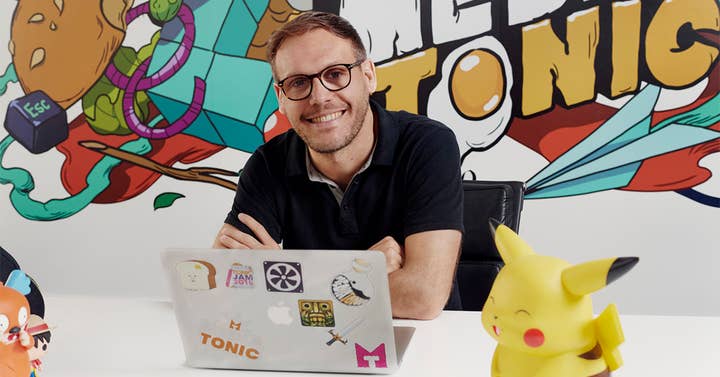Mediatonic stealthily evolves to take bigger risks
Co-founder Dave Bailey tells us why forming the Tonic Games Group will enable his teams to make more unorthodox games
There are more than two billion people in the world who play video games, according to estimates from various analysts.
It's a figure that has motivated companies such as Google and Amazon to up the ante in the games space, but their output to date doesn't seem too dissimilar from the established offerings from long-running publishers and platform holders.
But if you think about the true implications of that grand global audience, it suggests that video games have only scratched the surface in how you cater for two billion people's tastes. That's certainly the belief of Mediatonic co-founder Dave Bailey.

"That figure blows my mind -- we're talking about a third of the population," he says. "Clearly within an audience that big, there are whole new types of content and ways we can use the medium of games to do stuff that just hasn't really been tried.
"[We should] utilise games as a way to do stuff that's completely new and ultimately has a positive impact. Games are fundamentally meant to be fun and uplifting experiences. I think there's a huge amount we can do there by innovating in the medium."
Mediatonic has been trying to explore this for years. It's currently working on the upcoming Fall Guys: Ultimate Knockout -- a battle royale that doesn't involve killing anyone -- and enjoyed success earlier this year with Murder By Numbers, a cross between detective mystery and picross. "That well-known genre mash-up," Bailey laughs.
The latter is a prime example of how self-sufficient the company is becoming. Since it was able to self-publish through The Irregular Corporation, a division it first established back in 2015, Mediatonic did not need to search for a publisher that would back such a bizarre concept.
"Because we could do the whole thing internally, we could own it and we could control the cost of that, we could still do something that was a bit out there," adds Bailey
The Irregular Corporation alone has "produced some pretty sizable hits in the last couple of years," and is a further example of producing unusual games, such as the self-explanatory but almost certainly unique PC Building Simulator.
"Games are fundamentally meant to be fun and uplifting. There's a huge amount we can do there by innovating"
But even as one of the UK's largest independent studios with a headcount of over 200 people, there are limits to the risks Mediatonic can take in pursuing new ideas and untapped audiences. The company has been working on the solution "quietly for four or five years," finally unveiling its plans last month.
A new parent company, the Tonic Games Group, has been formed to better organise and support Mediatonic and its sister studios. The group encompasses: Mediatonic and its development studios in London, Brighton, Madrid and newly-opened Leamington Spa location; Fortitude, a new Guildford-based studio by The Sexy Brutale co-creator James Griffiths; and The Irregular Corporation, which has a distributed team plus micro offices in Tokyo and Stockholm.
"We've been building these extra companies and studios for quite a while now, but under the radar," Bailey explains. "We just reached that tipping point where we were like, 'This isn't just on paper anymore, this is really a thing, so now it's time to take the lid off.'"
The co-founder is confident that the new structure gives Tonic Games Group's teams more stability and support, which means they can create games that are "a bit weird and wonderful" without worrying about the risk as much as they have in the past.

"The whole portfolio is so large and so diverse that when we take a bit of a gamble on one thing, it's supported by everything else," he says. "That was really the founding principle of why we went on this mission to build a group. Because if you're trying to do something that's completely new, it's risky. Game development is risky in and of itself.
"We've got a lot of battle scars from our first ten years, where we've been through things like publisher restructures, studio closures, all these kinds of things. Those are things that I feel really get in the way of creativity and make it more difficult to try something new. That's why building this multi-studio structure, where the bigger ones can support the smaller ones and we can share resources across what we're doing. It makes things much easier for us, and ultimately helps us grow overall."
It also places the group in a better position to support other studios in a way its subsidiaries haven't before. PC Building Simulator was originally being developed by a lone developer in Romania, but The Irregular Corporation was able to serve as a publishing team that could acquire all the licenses and hardware brands needed to cater to that game's audience, while the Mediatonic Madrid team could assist with development. This sort of collaboration can now be recreated on a larger scale, thanks to the structure of the group.
"[Our] portfolio is so large and diverse that when we take a bit of a gamble on one thing, it's supported by everything else"
While the formation of the Tonic Games Group is a big moment for Mediatonic, Bailey says plans for growth continue unabated. The company has been hiring an average of 12 people per month -- sometimes as many as 20 -- for the past year, and this is expected to continue.
That's not to say the newly-formed group is about to embark upon an acquisition spree, of course. While other companies, such as the THQ Nordic parent Embracer Group or Curve Digital owner Catalis Group, expand by bringing established teams into the fold, Bailey expects Tonic Games' growth will be "more like cells dividing and reproducing by division."
"As we grow, learn and build up muscle memory, we can spin out new ventures," he says. "We add bits on but it's an organic process, rather than going out and buying large teams."
And even though The Irregular Corporation gives the group an internal publishing team, Bailey does not rule out working with other publishers.
"It's really nice to be able to have the provision within our group to be able to publish our own titles, and that's been proven for the first time with Murder By Numbers," he says. "But different kinds of projects need different kinds of partners. If you look at a game with Fall Guys, we're working with Devolver because they're the absolute perfect match for that game.
"So we're still going to keep working with partners. We'll be quite fussy, quite selective, and only work with partners we know and trust and know that they bring something to the game we're producing. But when the glove fits, we can use The Irregular Corporation to publish titles internally too, which is a cool step for us."

The new group structure has also helped Mediatonic and the other teams offset the impact of the coronavirus pandemic -- not just on the business, but on its staff. Last year, Mediatonic won the GamesIndustry.biz Best Places To Work UK Award for Mental Health & Wellbeing, and these are areas Bailey wants to double down on during this crisis and in the long-term.
"Now that we're building a group, we have the ability to do stuff maybe we couldn't before, to try and improve the way people make games and the effect it has on their lives," he says.
"We've really invested in building a large central people team, which is doing things like building out mental health programs, solving remote onboarding and all these kinds of things. Any of our smaller teams wouldn't have access to that if it wasn't for the central group, so it's helping us do a better job of coping with the changes."
Finally, Bailey hopes this new structure is one that will "stand the test of time." Mediatonic was first formed in 2005, and the industry has changed in many ways during that time. Some companies have thrived, others have survived, and still others weren't so fortunate. The Tonic Games Group is designed to help ensure none of its companies meet that fate, in order to give their developers more opportunities to explore creative new possibilities.
"Looking back on some of the experiences Paul and I had in our first decade, with studios opening and closing left, right and centre, and [I can see] how much that affected us," says Bailey. "I think it's really counter-productive to being creative and doing interesting things. So we're trying to build a company that doesn't ramp up and down but is fundamentally long-lasting by design, by being diverse."

